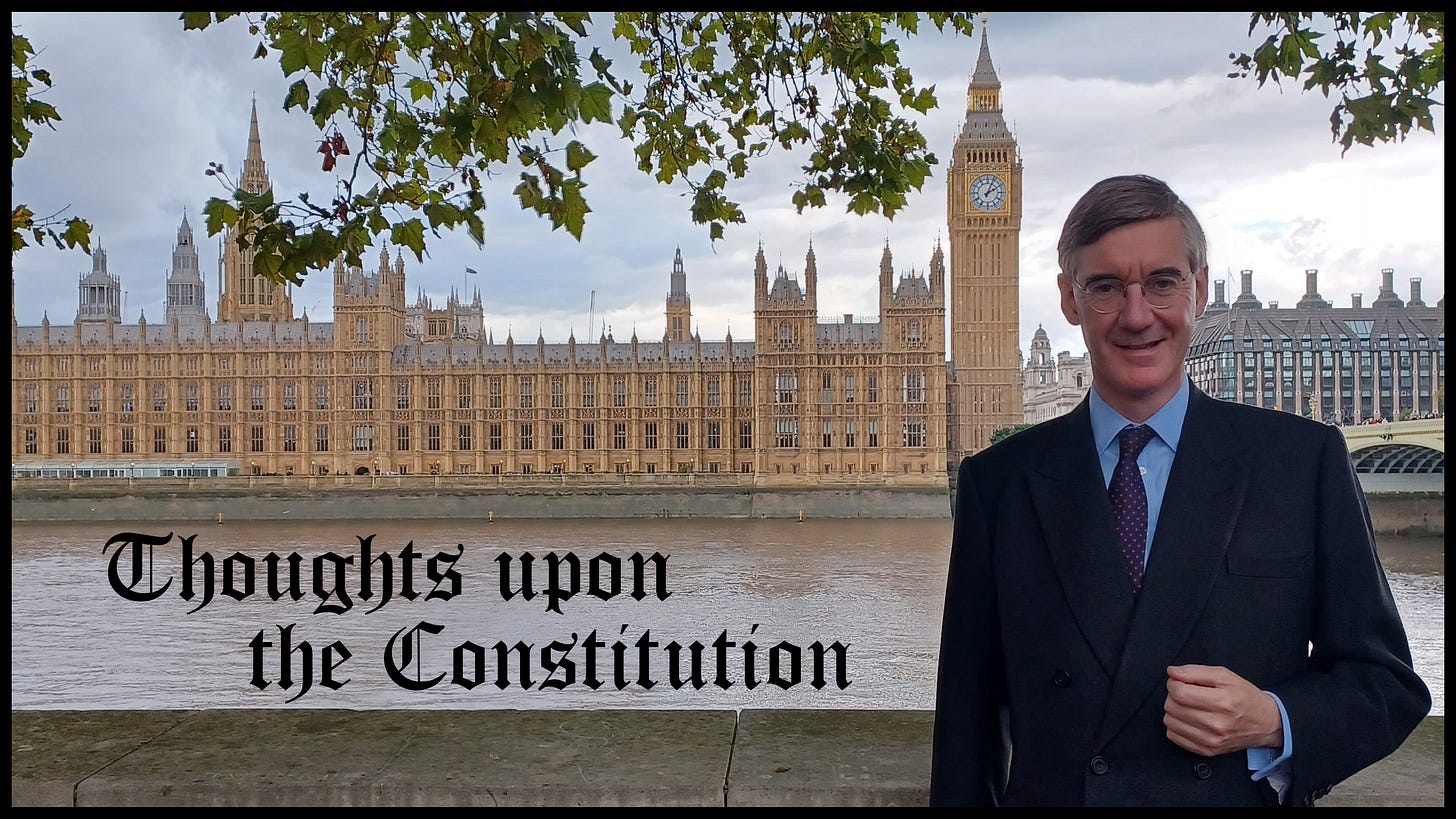England, and subsequently the United Kingdom, has a long history of the King being under the law. In modern parlance, it is probably better to say the Crown, as that encompasses the administrative state in a way that is separate from the person of the King or, indeed, Queen, which was not a consideration in mediaeval times.
Thus, the State and its agents must obey the law. In addition, the courts (still, as it happens, administering justice in the name of the King) must uphold the law, on occasions, for the individual against the State.
In practice, this means that, as it is written in Magna Carta, “no free man shall be seized, imprisoned, dispossessed, outlawed, exiled, or ruined in any way, nor in any way proceeded against, except by the lawful judgment of his peers and the law of the land”.
This is still the law, and provides a reasonable level of protection against arbitrary government, but it begs the question of what is the law of the land and how is it made? The answer to this has evolved over the centuries, but was fairly simple from the reign of Henry VIII until the 1970s.
St. Thomas More, after he had been found guilty of treason, took the opportunity to speak and set out his position that there were certain things that Parliament simply could not legislate for. It could not override God's law. This compelling argument, which must be true in an absolute sense, is nonetheless not true in a constitutional one. The proof of this lies in More's execution and martyrdom. The law of England was the law passed by Parliament, and no power, even divine, could overrule it.
This was the position accepted by all and formulated by Albert Dicey. He explained how parliamentary sovereignty worked, and developed a theory of referendums in place of the House of Lords, being the protector of the constitution, following the 1911 Parliament Act.
In essence, there is nothing the King in Parliament cannot make law, which then is unchallengeably the law of the land. The courts must follow, and have no ability to override, a clear statute.
This was recently reiterated by the Supreme Court in its Rwanda judgment. Yet Parliament itself has legislated to create confusion and allow for its decisions to be overturned.
The 1972 European Communities Act allowed for this, by bringing in the concept of superior law, which could, indeed, exceed that of Parliament. The Human Rights Act has a similar effect, albeit through a different mechanism. In respect of both of these, the dualist nature of English law is important.
In this country, there are two types of law, which have differing effects. There is domestic law, be it common law or statute law, this has binding effect and may only be changed by statute. The common law, once changed by statute, cannot, by convention, be reinstituted. But, nonetheless, the judgments of the courts have precedential effect, and therefore the common law grows, unless and until it is replaced by statute law.
There is also international law, which may be agreed by the government under the prerogative powers of the Crown. This is binding on the government, but not in the country at large, unless given effect by statute.
The 1972 European Communities Act gave direct effect to European law. The statute not only incorporated the existing body of law into the UK, but it also provided a future mechanism whereby rulings of the European Court would bind domestically and new regulations could be brought in straight away.
The Human Rights Act does not provide direct effect, but allows existing and subsequent laws to be interpreted as far as possible within its terms, or a Certificate of Incompatibility may be issued by our domestic courts. If such a Certificate were issued, as in the current case affecting Northern Ireland and the possibility of compensation for Gerry Adams, there is a simplified parliamentary mechanism for rectifying the incompatible Act. A piece of secondary legislation may be used to override primary legislation.
This retains the clear supremacy of Parliament, as it could refuse to follow the judgment of incompatibility, and it is in line with the dualist system, foreign law is given direct effect through Parliament, not of its own.
However, this government, and especially Sir Keir Starmer's crony Attorney General, Lord Hermer, seems to want to impose international law on everything, even when it ought not to apply.
The scandal over the desire to pay billions of pounds to Mauritius to take the Chagos Islands off us, without any consideration of the desires of the Chagossians or of British rights, is part of this. The possibility of paying compensation to Gerry Adams is another.
The government believes that there is a higher law by which it is bound, and this is a classic socialist view. They have been waiting for generations for the workers of the world to unite, and international law is an effort to make them do so without democratic consent.
International law is a product of those who believe that democracy does not really work. It is symbolically important that the current Attorney General, unusually but not unprecedentedly, sits in the House of Lords, not the Commons. International law is not law in the same way as UK law. There is no Parliament that makes it, no electorate that can vote for it. There is no elected government to be held accountable for it.
International law has grown up out of the Westphalian settlement, by accident rather than design. In 1648, it was decided, at the end of the Thirty Years' War, that the legitimate authority was the individual state. Some of them at that time were tiny, but nonetheless enjoyed sovereignty within their own borders.
This was reinforced with the Treaty of Vienna and subsequent 19th century agreements, when the major powers decided to safeguard the rights of smaller ones, and indeed created some countries such as Belgium. The British guarantee to Belgium was one of the causes of the First World War, and the reason for our declaration of war against Germany.
All of this was done on a nation-state basis until after World War I, when the League of Nations was established. This sought to oversee national relations, and gave mandates to the main powers to rule other places, hence the UK rule of Palestine. It gave a faux legal cover for the victors to dismember the German Empire, but the real reason they were able to do it was because they had won the war.
After the Second World War, this effort was repeated with the creation of the United Nations and a slew of other organisations. These have become increasingly important to the UK, but other nations do not necessarily accord them the same importance or, in some cases, any importance at all.
The United States, which thanks to the Senate is able to protect its sovereignty, has not signed up to a number of these bodies, including the International Criminal Court. Unfortunately, we have, and even when we do not accept jurisdiction, sadly we seem to follow its conclusions.
This is the situation regarding Chagos, where we specifically and clearly do not accept that the International Court of Justice has any jurisdiction. We do not recognise its jurisdiction on disputes arising before the 1st January 1987, or on any dispute with an existing or former member of the Commonwealth. This is set out here: https://www.icj-cij.org/declarations/GB.
The situation could not be clearer, yet the Labour government wants to follow an advisory opinion that is damaging to national security and upsets our closest ally.
Hence, international law is used not as a means of deciding disputes among nations but as a method of controlling electors. This government does not like ‘populism’, which is merely another word for delivering what the voters want. In true socialist fashion it believes that it knows best in the interest of the collective against the individual, when international law gives them the ability to do this.
There is no opportunity for Nigel Farage or, indeed, anyone else, to seek election to the United Nations to try to change international law. No voter may campaign against it. Fundamentally, international law is bogus.
There may be some natural law that ought to govern relations between nations, some rules of common humanity concerning their internal affairs, but even these can only be applied in the event of military defeat of those accused. Vladimir Putin has not turned up to the Hague and President Xi is not being arraigned for crimes against the Uyghurs. Thus, victor's justice is wrapped up as a legal process, but forgotten about when there is no victory.
Unfortunately, in the UK, we have this vain idea that if we follow international law, others will be so impressed that they will copy us. But this is not true, nor would it be beneficial.
We need to govern in the interests of our own nation, according to the law that has a mandate. The stability of nation states comes from the robustness of their constitutions. Fictitious legal stratagems undermine the confidence of voters and have no mandate. It becomes the rule of lawyers, with electorates subordinated.
In the constitutional restoration that we need, these international agreements must be dropped. Once again, America has the right approach. It puts its national interest and its voters first. The United Kingdom should do the same.
If you have enjoyed this article, then please do share it with your friends.
Your comments would be most welcome. Please click the button to join the conversation. Thank you.












